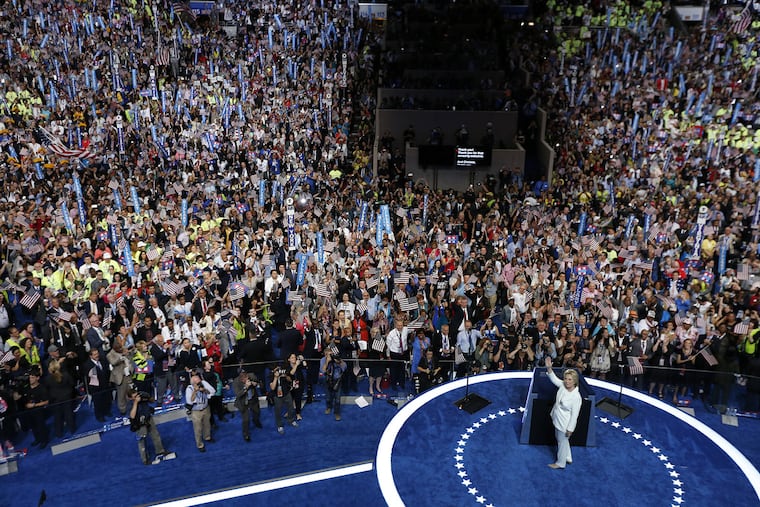Commentary: Voters not showing much pride in Clinton, Trump
With Hillary Clinton accepting the Democratic nomination in Philadelphia this week, we might expect that Americans, and especially women, are taking pride in her historic achievement as the first woman to lead a major party ticket. That is certainly what happened in 2008 when Americans of all stripes expressed pride that the nation had nominated its first African American candidate.

With Hillary Clinton accepting the Democratic nomination in Philadelphia this week, we might expect that Americans, and especially women, are taking pride in her historic achievement as the first woman to lead a major party ticket. That is certainly what happened in 2008 when Americans of all stripes expressed pride that the nation had nominated its first African American candidate.
Even if they did not support Barack Obama, many Americans recognized the historic nature of the election. However, a recent Mood of the Nation Poll by Penn State's McCourtney Institute for Democracy shows that going into the Democratic convention, this was not the case.
The scientific poll posed a series of open-ended questions to a representative sample of 1,000 Americans. It allowed ordinary citizens to tell us what is on their minds without restricting them to a small number of predetermined answers.
Some Clinton supporters tied the pride they have in their party directly to the historic nature of her campaign. "I am proud that we have a black president," said a 48-year-old woman from Illinois, "and I am proud that our next president will most likely be a woman." However, these and similar statements were somewhat unusual.
Our results show that a significant majority of Americans are not particularly proud of either candidate. Rather, many expressed disappointment in both of them. As one 77-year-old woman from California put it, there was "not much" that made her hopeful about politics, but she was ashamed that "we have to choose between Clinton and Trump." Overall, fewer than 5 percent of our sample took pride in either Donald Trump or Clinton.
We did find that Clinton is much less likely to be viewed negatively than Trump: He was more likely to be mentioned in reference to what makes people angry, ashamed, or worried than Clinton. As one 30-year-old African American man, who identifies as an independent, said when asked what he was ashamed of in American politics, "Donald Trump and his buffoonery."
However, given the historic nature of Clinton's candidacy, it is striking that not only are Americans not feeling pride in that milestone, but they are also far more likely to be hopeful about Trump than about her. One Trump supporter, a 39-year-old man who also identifies as an independent, referred to the candidate as "a true American stepping into the world of politics to save our nation from the corrupt politicians and Obama the Terrible!" This finding is evidence of the polarizing nature of Trump's candidacy - nobody is ambivalent about him. But where is the pride and hope around Clinton's history-making campaign?
We might expect that Clinton is at least generating positive emotions among women. But again, we see little evidence of this. More typical were the sentiments of a 41-year-old woman from California who, when asked what made her angry in American politics, responded, "I am angry that Donald Trump is the Republican nominee for president. I get angry every time I hear him speak, and I can't believe he has gotten this far in the presidential race." Women are supporting Clinton because of their strong distaste for Trump, not their pride and hope in Clinton herself.
Certainly one goal of Democrats this week was to emphasize the historic nature of Clinton's nomination. Another goal will be to make sure that this message is conveyed to men and women, young and old. If they are successful, we should see it reflected in our next poll that more people - women in particular - are taking pride and seeing hope in Clinton's historic campaign.
Michael Berkman is a professor of political science at Penn State. mbb1@psu.edu
Christopher Beem is the managing director of the McCourtney Institute of Democracy at Penn State. cxb518@psu.edu